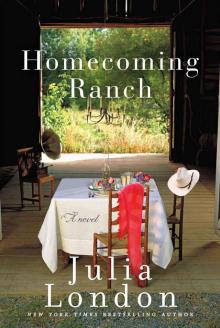- Home
- Julia London
The Trouble with Honor
The Trouble with Honor Read online
Passion and scandal collide in New York Times bestselling author Julia London’s brand-new series about four sisters determined to rescue themselves from ruin…
Desperate times call for daring measures as Honor Cabot, the eldest stepdaughter of the wealthy Earl of Beckington, awaits her family’s ruin. Upon the earl’s death she and her sisters stand to lose the luxury of their grand home—and their place on the pedestal of society—to their stepbrother and his social-climbing fiancée. Forced to act quickly, Honor makes a devil’s bargain with the only rogue in London who can seduce her stepbrother’s fiancée out of the Cabots’ lives for good.
An illegitimate son of a duke, George Easton was born of scandal and grows his fortune through dangerous risks. But now he and Honor are dabbling in a perilous dance of seduction that puts her reputation and his jaded heart on the line. And as unexpected desire threatens to change the rules of their secret game, the stakes may become too high even for a notorious gambler and a determined, free-spirited debutante to handle.
Praise for New York Times and USA TODAY bestselling author Julia London
“Julia London writes vibrant, emotional stories and sexy, richly drawn characters.”
—New York Times bestselling author Madeline Hunter
“The Last Debutante is another successful merger of witty writing and passionate romance that gracefully delivers everything romance readers could want.”
—Booklist
“London’s story is satisfying as it builds on the excellent chemistry of the leads, gracefully unfolding with the perfect amount of tension.”
—Publishers Weekly on The Revenge of Lord Eberlin
“Exceptionally entertaining…sinfully sexy.”
—Booklist on The Dangers of Deceiving a Viscount
“As London explores the intricate, authentic-feeling relationships blossoming among the players, her masterful ability to bring characters to life makes this romance entirely absorbing.”
—Publishers Weekly on The Dangers of Deceiving a Viscount
“London’s love story is tense and tender, held aloft by endearing, dynamic characters.”
—Publishers Weekly on The Perils of Pursuing a Prince
JULIA
LONDON
The Trouble with Honor
Dear Reader,
I am so excited to present The Trouble with Honor to you! This is my first book for the Harlequin HQN line, but I have written many historical romances, almost all of them set in the Regency period. I love the pageantry of the era and how society and the concern for appearances ruled the gentry. But I imagine that human nature being what it is, there were those who did not like to live by the rules, who chafed at being ruled at all and who dared to break the rules.
In this series about the Cabot sisters, I introduce four young, privileged women who are expected to aspire to a very good marriage and not much else. But when their fortunes begin to change, these four are determined to break the rules that bind them and define happiness on their own terms. However, when one is raised in the lap of luxury, and learns nothing more taxing than some intricate stitching, one may not be equipped to circumvent the rules. One’s attempts to do so may go very, very badly. I hope you enjoy the Cabot sisters and their shenanigans as much as I enjoyed writing them.
Happy reading,
Julia London
For my mother,
who instilled a love of books and reading in me
from the beginning.
Contents
CHAPTER ONE
CHAPTER TWO
CHAPTER THREE
CHAPTER FOUR
CHAPTER FIVE
CHAPTER SIX
CHAPTER SEVEN
CHAPTER EIGHT
CHAPTER NINE
CHAPTER TEN
CHAPTER ELEVEN
CHAPTER TWELVE
CHAPTER THIRTEEN
CHAPTER FOURTEEN
CHAPTER FIFTEEN
CHAPTER SIXTEEN
CHAPTER SEVENTEEN
CHAPTER EIGHTEEN
CHAPTER NINETEEN
CHAPTER TWENTY
CHAPTER TWENTY-ONE
CHAPTER TWENTY-TWO
CHAPTER TWENTY-THREE
CHAPTER TWENTY-FOUR
CHAPTER TWENTY-FIVE
CHAPTER TWENTY-SIX
CHAPTER TWENTY-SEVEN
CHAPTER TWENTY-EIGHT
CHAPTER TWENTY-NINE
CHAPTER THIRTY
CHAPTER THIRTY-ONE
CHAPTER THIRTY-TWO
CHAPTER THIRTY-THREE
CHAPTER THIRTY-FOUR
CHAPTER THIRTY-FIVE
CHAPTER THIRTY-SIX
CHAPTER ONE
THE TROUBLE BEGAN in the spring of 1812, in a gaming hell south of the Thames, a seedy bit of Southwark known to be thick with thieves.
It was beyond comprehension how the old structure, originally built in the time of the Vikings, had become one of the most fashionable places for gentlemen of the Quality to be, but indeed it had. The interior was sumptuous, with thick red velvet draperies, rich wood and low ceilings. Night after night, they came from their stately Mayfair homes in heavily armed coaches to spend an evening losing outrageous sums of money to one another. And when a gentleman had lost his allotted amount for the evening, he might enjoy the company of a lightskirt, as there were ample private rooms and French women to choose from.
On a bitterly cold night, a month before the start of the social Season—when, inevitably, the gentlemen would eschew this gaming hell for the Mayfair assembly rooms and balls that had become a spring rite for the wealthy and privileged—a group of young Corinthians were persuaded by the smiles and pretty pleas of five debutantes to have a look at this gaming hell.
It was dangerous and foolish for the young men to risk forever marring the reputations of such precious flowers. But young, brash and full of piss, they’d been eager to please. They did not allow the hell’s rule of no women to deter them, or that any number of mishaps or crimes could befall the young women in the course of their lark. It was a bit of adventure in the middle of a gloomy winter.
It was in that Southwark gaming hell where George Easton first made the acquaintance of one of those debutantes: Miss Honor Cabot.
He hadn’t noticed the commotion at the door when the young bucks had arrived with their prizes, flush with the excitement of their daring and overly proud for having convinced the man at the door to give them entry. George had been too intent on divesting thirty pounds from Mr. Charles Rutherford, a notorious gambler, in the course of a game of Commerce. He didn’t realize anything was amiss until Rutherford said, “What the devil?”
It was then that he noticed the young women standing like so many birds, fluttering and preening in the middle of the room, their hooded cloaks framing their lovely faces, their giggles infecting one another while their gazes darted between the many men who eyed them like a paddock full of fine horses.
“Bloody hell,” George muttered. He threw down his cards as Rutherford stood, the poor lass in his lap stumbling as she tried to stop herself from being dumped onto the floor.
“What in blazes are they doing here?” Rutherford demanded. He squinted at the group of them. “Bloody unconscionable, it is. See here!” he rumbled loudly. “This is not to be borne! Those girls should be removed at once!”
The three young gentlemen who had undertaken this adventure looked at one another. The smallest one lifted his chin. “They’ve as much right to be present as you, sir.”
George could see from Mr. Rutherford’s complexion that he was in danger of apoplexy, and he said, quite casually, “Then, for God’s sake, have them sit and play. Otherwise, they’re a distraction to the gentlemen here.”
“Play?” Rutherford said, his eyes all but bulging from their sockets. “They are not fit to play!”
“I am,” said one lone feminine voice.
Ho there, which of them dared to speak? George leaned around Rutherford to have a look, but the birds were fluttering and moving, and he couldn’t see which of them had said it.
“Who said that?” Rutherford demanded loudly enough that the gentlemen seated at the tables around them paused in their games to see what was the commotion.
None of the young ladies moved; they stared wide-eyed at the banker. Just as it seemed Rutherford would begin a rant, one of them shyly stepped forward. A ripple went through the crowd as the lass looked at Rutherford and then at George. He was startled by the deep blue of her eyes and her dark lashes, the inky black of her hair framing a face as pale as milk. One did not expect to see such youthful beauty here.
“Miss Cabot?” Rutherford said incredulously. “What in blazes are you doing here?”
She curtsied as if she were standing in the middle of a ballroom and clasped her gloved hands before her. “My friends and I have come to see for ourselves where it is that all the gentlemen keep disappearing to.”
Chuckles ran through the crowd. Rutherford looked alarmed, as if he were somehow responsible for this breach of etiquette. “Miss Cabot...this is no place for a virtuous young lady.”
One of the birds behind her fluttered and whispered at her, but Miss Cabot seemed not to notice. “Pardon, sir, but I don’t understand how a place can be quite all right for a virtuous man, yet not for a virtuous woman.”
George couldn’t help but laugh. “Perhaps because there is no such thing as a virtuous man.”
Those startlingly blue eyes settled on George once more, and he felt a strange little flicker in his chest. Her gaze dipped to the cards. “Commerce?” she asked.
“Yes,” George said, impressed that she recognized it. “If you desire to play, miss, then bloody well do it.”
Now all the blood had drained from Rutherford’s face, and George was somewhat amused that he looked close to fainting. “No,” Rutherford said, shaking his head and holding up a hand to her. “I beg your pardon, Miss Cabot, but I cannot abet you in this folly. You must go home at once.”
Miss Cabot looked disappointed.
“Then I’ll do it,” George said and, with his boot, kicked out a chair at his table. Another murmur shot through the crowd, and the tight group of little birds began to flutter again, the bottoms of their cloaks swirling about the floor as they twisted and turned to whisper at each other. “Whom do I have the pleasure of abetting?” he asked.
“Miss Cabot,” she said. “Of Beckington House.”
The Earl of Beckington’s daughter, was she? Did she say that to impress him? Because it didn’t. George shrugged. “George Easton. From Easton House.”
The girls behind her giggled, but Miss Cabot did not. She smiled prettily at him. “A pleasure, Mr. Easton.”
George supposed she’d learned to smile like that very early on in life in order to have what she liked. She was, he thought, a remarkably attractive woman. “These are not parlor games, miss. Have you any coin?”
“I do,” she said, and held out her reticule to show him.
Lord, she was naive. “You’d best put that away,” he said. “Behind the silk neckcloths and polished leather boots, you’ll find a den of thieves between these walls.”
“At least we’ve a purse, Easton, and haven’t sunk it all in a boat,” someone said.
Several gentlemen laughed at that, but George ignored them. He’d come to his fortune with cunning and hard work, and some men were jealous of it.
He gestured for the lovely Miss Cabot to sit. “You scarcely seem old enough to understand the nuances of a game such as Commerce.”
“No?” she asked, one brow arching above the other as she gracefully took a seat in the chair that a man held out for her. “At what age is one considered old enough to engage in a game of chance?”
Behind her, the birds whispered fiercely, but Miss Cabot calmly regarded George, waiting for his answer. She was not, he realized, even remotely intimidated by him, by the establishment or by anything else.
“I would not presume to put an age on it,” he said cavalierly. “A child, for all I care.”
“Easton,” Rutherford said, his voice full of warning, but George Easton did not play by the same rules as the titled men here, and Rutherford knew it. This would be diverting; George had no objection to passing an hour or so with a woman—anyone in London would attest to that—particularly one as comely as this one. “Are you prepared to lose all the coins you’ve brought?”
She laughed, the sound of it sparkling. “I don’t intend to lose them at all.”
The gentlemen in the room laughed again, and one or two of them stood, moving closer to watch.
“One must always be prepared to lose, Miss Cabot,” George warned her.
She carefully opened her reticule, produced a few coins and smiled proudly at him. George made a mental note not to be swept up by that smile...at least not while at the gaming table.
Rutherford, meanwhile, stared with shock at both Miss Cabot and George, then slowly, reluctantly, took his seat.
“Shall I deal?” George asked, holding up the deck of cards.
“Please,” Miss Cabot said, and put her gloves aside, neatly stacked, just beside her few coins. She glanced around the room as George shuffled the deck of cards. “Do you know that I have never been south of the Thames? Can you imagine, my whole life spent in and around London, and I’ve never come south of the Thames?”
“Imagine,” he drawled, and dealt the cards. “Your bet to begin, Miss Cabot.”
She glanced at her cards that were lying faceup, and put a shilling in the middle of the table.
“A bob will not take you far in this game,” George said.
“Is it allowed?”
He shrugged. “It is.”
She merely smiled.
Rutherford followed suit, and the woman who had occupied his lap for most of the evening resumed her seat, sliding onto his knee, her gaze challenging Miss Cabot.
“Oh,” Miss Cabot murmured, apparently as she realized what sort of woman would sit on Rutherford’s lap, and glanced away.
“Are you shocked?” George whispered, amused.
“A bit,” Miss Cabot responded, stealing a look at the young whore again. “I rather thought she’d be...homelier. But she’s quite pretty, isn’t she?”
George glanced at the woman on Rutherford’s lap. He would call her alluring. But not pretty. Miss Cabot was pretty.
He glanced at his hand—he held a pair of kings. This would be an easy victory, he thought, and made his bet.
A servant walked by with a platter of food for a table that had resumed its play. Miss Cabot’s gaze followed it.
“Miss Cabot,” George said.
She looked at him.
“Your play.”
“Oh!” She studied the cards and picked up another shilling and placed it in the middle.
“Gentlemen, we’ve had two bobs bet this evening. At this rate, we might hope to conclude the game at dawn.”
Miss Cabot smiled at him, her blue eyes twinkling with amusement.
George reminded himself that he was not to be drawn in by pretty eyes, either.
They went round again, during which Rutherford apparently forgot his reluctance to play with the debutante. On the next round, Miss Cabot put in two shillings.
“Miss Cabot, have a care. You don’t want to lose all you have in the first game,” one of the young bucks said with a nervous laugh.
“I hardly think it will hurt any less to lose all that I have in one game or six, Mr. Eckersly,” she said jovially.
George won the hand as he knew he would, but Miss Cabot didn’t seem the least bit put off by it. “I think there should be more games of chance at the assembly halls, don’t you?” she asked of the growing crowd around them. “I
t makes for a better diversion than whist.”
“Only if one is winning,” a man in the back of the crowd said.
“And with her father’s money,” Miss Cabot quipped, delighting the small but growing crowd around them, as well as the birds who had accompanied her, as they now had the attention of several gentlemen around them.
They continued on that way, with Miss Cabot betting a shilling here or there, bantering with the crowd. It was not the sort of high-stakes game George enjoyed, but he did enjoy Miss Cabot, very much. She was not like what he would have supposed for a debutante. She was witty and playful, delighting in her small victories, debating the play of her cards with whomever happened to be standing behind her.
After an hour had passed, Miss Cabot’s purse was reduced to twenty pounds. She began to deal the cards. “Shall we raise the stakes?” she asked cheerfully.
“If you think you can afford my stakes, you have my undivided attention,” George said.
She gave him a pert look. “Twenty pounds to play,” she said, and began to deal.
George couldn’t help but laugh at her naïveté. “But that’s all you have,” he pointed out.
“Then perhaps you will take my marker?” she asked, and lifted her gaze to his. Her eyes, he couldn’t help noticing, were still sparkling. But in a slightly different way. She was challenging him. Heaven help him, the girl was up to something, and George could not have been more delighted. He grinned.
“Miss Cabot, I must advise you against it,” one of the bucks said, the same one who had grown more nervous as the game had progressed. “It’s time we returned to Mayfair.”
“Your caution and timekeeping are duly noted and appreciated, sir,” she said sweetly, her gaze still on George. “You’ll humor me, won’t you, Mr. Easton?” she asked. “You’ll take my marker?”
George had never been one to refuse a lady, particularly one he found so intriguing. “Consider yourself humored,” he said with a gracious bow of his head. “I shall take your marker.”
Word that he had taken a marker from Miss Cabot spread quickly through the gaming hell, and in a matter of minutes, more had gathered around to watch the debutante lose presumably something of value to George Easton, the notorious and self-proclaimed bastard son of the late Duke of Gloucester.

 A Royal Kiss & Tell
A Royal Kiss & Tell You Lucky Dog
You Lucky Dog The Devil in the Saddle
The Devil in the Saddle The Trouble with Honor
The Trouble with Honor Tempting the Laird
Tempting the Laird The Secret Lover
The Secret Lover A Light at Winter’s End
A Light at Winter’s End The Charmer in Chaps
The Charmer in Chaps Homecoming Ranch
Homecoming Ranch Jack (7 Brides for 7 Soldiers Book 5)
Jack (7 Brides for 7 Soldiers Book 5) A Courtesan's Scandal
A Courtesan's Scandal Hard-Hearted Highlander--A Historical Romance Novel
Hard-Hearted Highlander--A Historical Romance Novel The Complete Novels of the Lear Sister Trilogy
The Complete Novels of the Lear Sister Trilogy The Last Debutante
The Last Debutante Suddenly Single (A Lake Haven Novel Book 4)
Suddenly Single (A Lake Haven Novel Book 4) Seduced by a Scot
Seduced by a Scot Highlander Unbound
Highlander Unbound Suddenly Dating (A Lake Haven Novel Book 2)
Suddenly Dating (A Lake Haven Novel Book 2) The Bridesmaid
The Bridesmaid The Seduction of Lady X
The Seduction of Lady X One Mad Night
One Mad Night Extreme Bachelor
Extreme Bachelor The Scoundrel and the Debutante
The Scoundrel and the Debutante The Revenge of Lord Eberlin
The Revenge of Lord Eberlin American Diva
American Diva The Lovers: A Ghost Story
The Lovers: A Ghost Story The Hazards of Hunting a Duke
The Hazards of Hunting a Duke Return to Homecoming Ranch (Pine River)
Return to Homecoming Ranch (Pine River) The Perils of Pursuing a Prince
The Perils of Pursuing a Prince Highlander in Love
Highlander in Love The Devil Takes a Bride
The Devil Takes a Bride Devil in Tartan
Devil in Tartan Wild Wicked Scot
Wild Wicked Scot Snowy Night with a Highlander
Snowy Night with a Highlander One Season of Sunshine
One Season of Sunshine Summer of Two Wishes
Summer of Two Wishes All I Need Is You aka Wedding Survivor
All I Need Is You aka Wedding Survivor Sinful Scottish Laird--A Historical Romance Novel
Sinful Scottish Laird--A Historical Romance Novel Suddenly Engaged (A Lake Haven Novel Book 3)
Suddenly Engaged (A Lake Haven Novel Book 3) Highlander in Disguise
Highlander in Disguise Suddenly in Love (Lake Haven#1)
Suddenly in Love (Lake Haven#1)